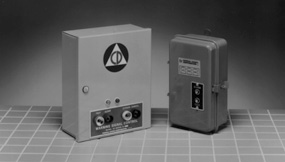AX Timer: Difference between revisions
mNo edit summary |
No edit summary |
||
| Line 1: | Line 1: | ||
===Overview=== | |||
[[File:AR and PGA Official.jpg|200px|framed|right|AR and PGA timers, AR on the left]] | [[File:AR and PGA Official.jpg|200px|framed|right|AR and PGA timers, AR on the left]] | ||
The AR Timer was a signal timer produced by [[Federal Signal Corporation]]. It is capable of two three-minute signals, [[Attack Signal|attack]] and [[Alert Signal|alert]]. There was also a unit called the AR-5 that increased the signal duration to five minutes. In addition to the Alert, Attack, and Cancel buttons on the unit itself, the timer provides terminals for either external push buttons or remote activation equipment. In remote installations the AR Timer was generally installed inside of an [[ARCH]] cabinet, which contained the timer unit as well as [[:Category:Remote Activation Equipment|remote activation equipment]], such as a radio with tone decoder. | The AR Timer was a signal timer produced by [[Federal Signal Corporation]]. It is capable of two three-minute signals, [[Attack Signal|attack]] and [[Alert Signal|alert]]. There was also a unit called the AR-5 that increased the signal duration to five minutes. In addition to the Alert, Attack, and Cancel buttons on the unit itself, the timer provides terminals for either external push buttons or remote activation equipment. In remote installations the AR Timer was generally installed inside of an [[ARCH]] cabinet, which contained the timer unit as well as [[:Category:Remote Activation Equipment|remote activation equipment]], such as a radio with tone decoder. | ||
===Changes over the years=== | |||
The AR timer underwent changes throughout the years, which resulted in three different revisions. These revisions affected the circuitry and appearance of the unit, however the functionality remained the same. | |||
====Revision 1 (early 1950's to mid 1960's)==== | |||
[[File:Rev_1_AR_timer.JPG|300px|thumb|right|The first revision of the AR timer]] | |||
[[File:AR_timer_rev_1_internals_.JPG|300px|thumb|right|The internals of the rev. 1 AR timer]] | |||
The first revision of the AR timer was used on the early A-series Thunderbolts and differs from the later revisions in a few ways. The most notable difference is the physical appearance, with a single red light, a wider design, exposed buttons, and the lack of a cancel button. Internally, the components are a bit more simplified, consisting of the motor and cams, the switches, and two relays. In addition, the components are spaced out more and are a bit more exposed. | |||
[[Category:Federal Signal Corporation]][[Category:Siren Control Equipment]][[Category:Signal Timer]][[Category:Electromechanical Siren Controls]] | [[Category:Federal Signal Corporation]][[Category:Siren Control Equipment]][[Category:Signal Timer]][[Category:Electromechanical Siren Controls]] | ||
Revision as of 02:25, 11 January 2017
Overview

The AR Timer was a signal timer produced by Federal Signal Corporation. It is capable of two three-minute signals, attack and alert. There was also a unit called the AR-5 that increased the signal duration to five minutes. In addition to the Alert, Attack, and Cancel buttons on the unit itself, the timer provides terminals for either external push buttons or remote activation equipment. In remote installations the AR Timer was generally installed inside of an ARCH cabinet, which contained the timer unit as well as remote activation equipment, such as a radio with tone decoder.
Changes over the years
The AR timer underwent changes throughout the years, which resulted in three different revisions. These revisions affected the circuitry and appearance of the unit, however the functionality remained the same.
Revision 1 (early 1950's to mid 1960's)
The first revision of the AR timer was used on the early A-series Thunderbolts and differs from the later revisions in a few ways. The most notable difference is the physical appearance, with a single red light, a wider design, exposed buttons, and the lack of a cancel button. Internally, the components are a bit more simplified, consisting of the motor and cams, the switches, and two relays. In addition, the components are spaced out more and are a bit more exposed.